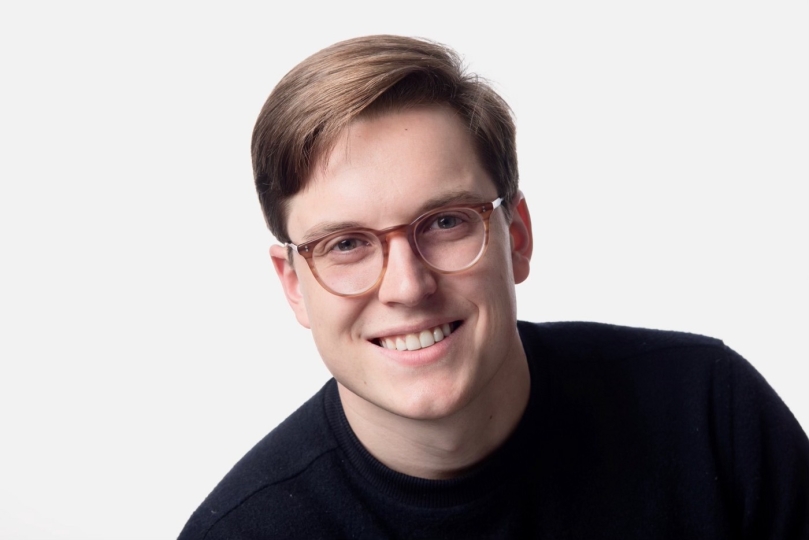Infertility impacts 10 to15 percent of couples in the United States. In vitro fertilization (IVF) can cost up to $25,000 per cycle. And according to the CDC, less than 25% percent of pregnancy cycles involving assisted reproductive technology result in live births.
Paxton Maeder-York, S.B. ’14, S.M. ’19
Fertility care in the U.S. today is largely expensive and inaccessible, but Paxton Maeder-York’s company Alife Health is using artificial intelligence to help improve outcomes and care for fertility patients. Alife combines Maeder-York’s background in bioengineering, computer science and business, coupled with his professional health-tech start up experience and a personal connection to IVF.
“My younger brother is an IVF baby, so it’s a very important mission for me,” he said. “We’re working to optimize every step of the process, from patients first figuring out what their chances of success are and how much it will cost, to actual clinical decisions about what medications to prescribe in order for patients’ eggs to be retrieved.”
Medical technology has always fascinated Maeder-York, S.B. ‘14, S.M. ‘19. He has early memories of robotics camps at MIT as a young student and observing surgeries at Massachusetts General Hospital as a high schooler. At SEAS, he joined the Harvard Biorobotics Lab of Rob Howe, Abbott and James Lawrence Professor of Engineering.
“The Harvard biomedical engineering department prepared me extremely well to be an entrepreneur and build these types of technologies while working closely with clinicians to ensure real world application is feasible,” he said. “I was so lucky to work and learn under Professors Rob Howe and Conor Walsh. They taught me how to develop these types of technology and motivated me to pursue my passions.”
Following his undergraduate studies, Maeder-York spent three years working for Auris Health, based in San Francisco, on the company’s surgical robotic system for treating lung cancer. That experience paved the way to founding Alife.
“I lost several grandparents to lung cancer, so Auris’s mission was really important to me,” he said. “I absorbed how the team thought about building complex medical devices such as multi-armed surgical robotics systems, working with different clinicians, integrating the pieces and building a business around it. This experience gave me the experience to do it myself.”
Auris was acquired by Johnson & Johnson for $3.4 billion in 2019, the same year Maeder-York completed his master’s degree in computational science at SEAS and MBA from Harvard Business School (HBS). He founded Alife a year later, winning the grand prize at the 2020 BHS New Venture Competition. Alife has since raised $9.5 million in seed capital and an additional $22 million in series A funding as it prepares to enter the early commercialization phase.
“There’s a lot of excitement for AI to help improve fertility care,” he said. “We’ve brought together a world-class team of data scientists and experienced medical technologists from surgical robotics and other areas to build this technology and bring it into practice.”
Alife’s AI algorithm relies on a massive data set of previous IVF cycles, one compiled through partnerships with clinics and physicians from around the country. By analyzing numerous cases, the AI can also help predict the viability of fertilized embryos during the IVF process.
Alife plans to offer three main products. Its first, called Stim Assist, will be used to help clinicians choose the best medications, timelines, and doses to increase the number of mature eggs retrieved for later use. The second, called Embryo Predict, will help embryologists to analyze fertilized embryos to prioritize them for successful transfer. The implications are lower costs for patients and more predictability for clinics.
There will also be a patient app to help manage the day-to-day aspects of IVF, which came about following extensive interviews with past IVF patients. Across the board, patients asked for ways to organize and simplify tasks such as medication reminders, appointment times, lab results and educational resources.
“What we’re really doing with artificial intelligence is enhancing the experience of a clinician with additional learnings from hundreds of thousands of historical patient cycles. This supercharges their ability to make the best decisions for their patients,” Maeder-York said. “I’ve always had a strong conviction that this technology should exist and will help those who want to be parents achieve their goal.”
Alife is the culmination of many of Maeder-York’s educational and professional experiences. It’s a biomedical technology start-up that draws on both his undergraduate concentration and the data science techniques acquired during his graduate education. His company’s early funding came from a Harvard Business School competition and has since grown thanks to the entrepreneurial skills he gained while pursuing his MBA.
Now Maeder-York hopes he can put all of that together to help couples experiencing infertility create the families they’ve always wanted.
“We’re focused on building a modern operating system for IVF clinics that’s enhanced with artificial intelligence,” he said. “Clinicians out there are constantly delivering top-notch care. We are trying to support and empower those clinicians with analytics so they can make the best decisions possible for their patients.”
Press Contact
Matt Goisman | mgoisman@g.harvard.edu
